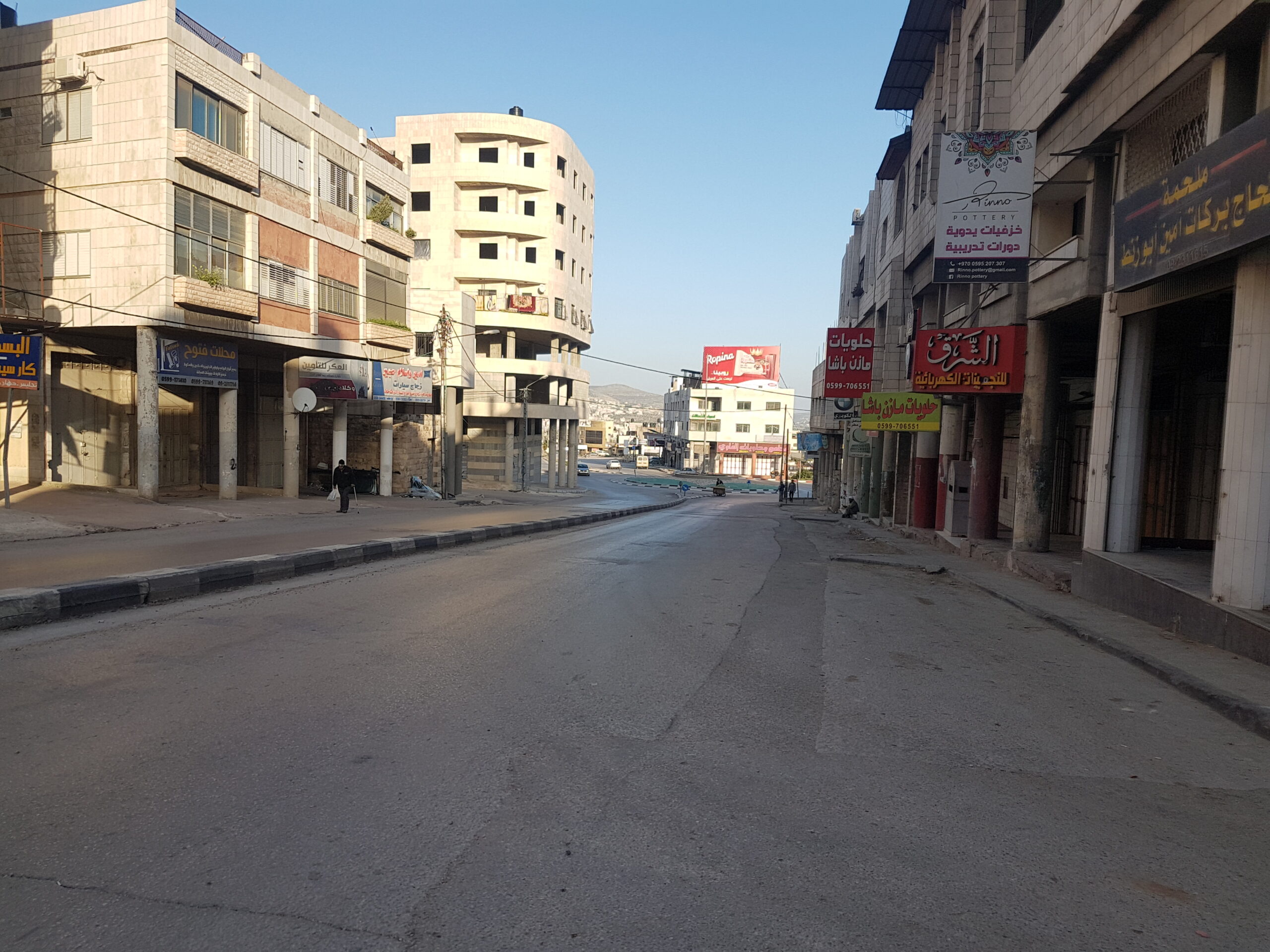You don’t need Henry Kissinger to tell you that the virus will change the world, writes As’ad AbuKhalil.

Amman Street in the city of Nablus empty during quarantine in Palestine. (CC BY-SA 4.0, Wikimedia Commons)
By As`ad AbuKhalil
Special to Consortium News
 While it is too early to determine the exact features of the changes that the Coronavirus will bring to the Middle East, there are already signs of change. This virus, as any pandemic, will alter public, defense and intelligence policies in the years to come in the region and in the world.
While it is too early to determine the exact features of the changes that the Coronavirus will bring to the Middle East, there are already signs of change. This virus, as any pandemic, will alter public, defense and intelligence policies in the years to come in the region and in the world.
You don’t need Henry Kissinger to tell you that the virus will change the world, and the world order. The Middle East will not be spared the colossal changes that are to come.
On the global scale, it’s likely Western governments will try to impose their hegemony and tightly run developing countries. After the Ebola outbreak of 2014–2015, Bill Gates “called for the creation of a worldwide, militarized, supranational authority capable of responding decisively to outbreaks of infectious disease — an authority governed by Western powers and targeting the underdeveloped world.” That vision will become a reality most likely in the near future.
The U.S. and its allies want to control not only their own borders, but the borders of other countries. Just as the U.S. “war on terrorism” enabled Washington to project its power to fight an enemy that seemed to exist in every corner in the globe — according to the U.S. — the war on epidemics will enable the U.S. to project more military force and to infiltrate more countries in the name of saving humanity.
Even in the U.S., the military was given a role in civilian affairs (like in New York City) where those tasks could have been performed by civilian sectors of the government.

President Donald Trump in Norfolk, Virginia, as a U.S. Navy hospital ship prepares to depart to New York, March 28, 2020. (White House, Shealah Craighead)
The Middle East will likely be severely affected in the short and long term.
Prosperous economies in the Gulf will be strained. Traditionally, the stability and legitimacy of Gulf regimes have been based on a combination of ruthless, and often brutal, oppression and promises of prosperity and social security.
Yet, oil prices have plummeted at the same time as the economies of the region came to a standstill, and when the pandemic exposed the material and political ill-preparedness of the regimes of the Gulf. All Gulf regimes, as well as poorer Arab countries, were ill-prepared for the crisis. There were medical and material shortages throughout the region (as in developed countries such as the U.S., where the profit-motive prevails and where hospital beds are calculated on the basis of profit and not need).
Gulf Faces Crisis
Gulf regimes will face a serious crisis when their defense expenditures clash with their needs in health and education. (The defense budget is mainly a protection fee for the U.S. Donald Trump is the first president to expose the transactional nature of U.S. policies toward Gulf region.)
Middle East classrooms, like many in the U.S., are not at all prepared for on-line education, which has proven to be essential not only in terms of the lockdown crisis, but to meet the changing needs of present-day students. That Middle East regimes will have to spend more on health and education will pose a challenge: rich Gulf nations would need to either spend less on defense or deprive the royal families of the billions that have been freely available to them.
For poorer Arab countries, the challenge is different. Those nations that are tied to Western lending institutions and its dictates, will also have to spend more on education and health. But the IMF and World Bank are constantly pressuring indebted countries to spend less on social programs. Those regimes will be less likely to to follow the demands of Western institutions since Arab publics will demand an improvement in state education and health services, which are inadequate.

Private Sector Pitfalls
The failures of the private sector have been exposed in some Arab countries. Take Lebanon. It takes pride in its American University Hospital, which is considered the most advanced medical center in the Arab world. It is one of the best-funded private hospitals in the region, receiving donations from the private sector and the U.S. government.
By attracting medical tourism it serves the Lebanese economy. Yet, in the Coronavirus crisis, the AUH was nowhere to be seen. It retreated into the background while The Rafik Hariri University Hospital, Beirut’s poorly-funded state hospital, became the focal point of the pandemic and specialized in treating Covid-19 patients.
There was wide support in Lebanon for the state hospital, which was struggling historically because of reduced state funding. Wealthy Arabs saw no prestige in donations to a state hospital compared to donations to the American University Hospital. (Ironically, Beirut’s state hospital is named after Rafiq Hariri, who championed the private sector and wanted to privatize most state assets and enterprises in Lebanon. Hariri — and his descendants — donated to the American University of Beirut and not to Lebanese University or to state hospitals).
Public Pressure

Beirut protests Oct. 19, 2019. (Shahen Araboghlian, CC BY-SA 4.0, Wikimedia Commons)
It’s likely citizens across the region will insist on reconfiguring the philosophy and priorities of budgets. They will likely demand increased funding for state enterprises, hospitals and schools. These sectors that have been traditionally ignored, because they catered to the poorest members of society, and because Western governments and lending institutions consistently lobbied for “shrinking of state budget.”
How will governments respond to public demands for better state services and programs? Ruling regimes that ignore these demands will risk losing more legitimacy. Capitalism will be in crisis, in the West as well as in the Middle East, where there is not the same safety net that became available to some Western countries after the Great Depression.
The Coronavirus has already increased the control exercised by states over their citizens. Israel quickly extended its draconian “war on terrorism” tactics (which flagrantly violate the privacy and freedoms of the Arab under its rule) to patients with Covid-19.
The technological arms of the state, which are used to track movements of terrorist suspects, have been applied to patients. (Of course, in Israel, the rights of Arabs are much easier to violate than the rights of non-Arabs).

Chief of the General Staff, Aviv Kochavi, center, inspects the military laboratory for the diagnosis of coronavirus patients at Tzrifin base. (IDF Spokesperson’s Unit, CC BY-SA 3.0, Wikimedia Commons)
In other Arab countries, governments used the virus to crack down on the press. The Jordanian government clamped down hard and arrested three people for merely posting “inaccurate” information on the virus. That will provide the government with the right to monopolize the news about the pandemic — or about other matters — in the name of science or public health, or whatever reason they want in the future.
Suspicions between governments will increase. Borders between countries of the region were never as tightly shut as they have been during this crisis. At the time of the Spanish flu a century ago, barely any of these borders existed.
Even among countries of the Gulf Cooperation Council, borders were closed in the last several months. The UAE announced its intention to punish countries which didn’t accept citizens who’d been residing in the UAE.
Health and security considerations will be tightly applied as criteria for work and tourist visa applications to those countries. Naturally, this will benefit the rich who generally have better health indicators, and who can easily supply the medical records and certifications that would make them less of a risk.
The U.S. will utilize the crisis to insist on more data sharing with Middle East countries. This sharing will not only include terrorist suspects but also people who suffer from certain ailments. The U.S. will increase pressures on those governments to tightly control their borders and screen their visitors. But just as in the U.S., how will those countries in the region, such as the UAE, reconcile the tight control of borders and restrictions on visits while drawing on trade and tourism for state revenues?
There can be no “back-to-normal.” The rules of the new world and regional orders are not yet written. But they are likely to contribute to more repression, tighter control of the media and curtailed movement for the poorest citizens. Those changes, along with budget constraints, will likely result in more political instability in the years to come.
Another wave of Arab uprisings may be just around the corner.
As’ad AbuKhalil is a Lebanese-American professor of political science at California State University, Stanislaus. He is the author of the “Historical Dictionary of Lebanon” (1998), “Bin Laden, Islam and America’s New War on Terrorism (2002), and “The Battle for Saudi Arabia” (2004). He tweets as @asadabukhalil
If you value this original article, please consider making a donation to Consortium News so we can bring you more stories like this one.
Before commenting please read Robert Parry’s Comment Policy. Allegations unsupported by facts, gross or misleading factual errors and ad hominem attacks, and abusive or rude language toward other commenters or our writers will not be published. If your comment does not immediately appear, please be patient as it is manually reviewed. For security reasons, please refrain from inserting links in your comments, which should not be longer than 300 words.

I think Jeff means by ‘ The West ‘ the powers-that-be who have made their head-quarters since WW2 at least in the USA. Although there are arguably less treaties in the World today than in 1939, any major war started by the American Empire or any war which involves a Russian client state, could trigger WW3. If the US loses that war, which hinges only on whether nuclear bombs can penetrate missile shields ( either sides ) , the instigators will have nowhere to go.
I don’t know. Seems to me if there is a period of relative peace (from the standpoint of military actions) then this could be built upon into something that fosters a bit of deserved autonomy for the many Middle Eastern countries. Assuming the US military gets the hell out of there. So rather than viewing what is happening as more of the same, perhaps it could be a phase shift in relations.
Just an attempt to put a positive light on things.
Ken
The Military has no intention of leaving any country at any time. To have a ‘ presence ‘ even as small as a small base with 200 personnel, is leverage and sets the precedent to expand that presence at will. The point is that the American Empire always wants to occupy states, and garrison them, on the same principal that supermarkets buy up suitable land at least partly to stop competitor supermarket chains from buying said land. As long as the American Empire seeks to expand it will occupy sites in states at least partly to stop the Russians from doing the same.
The C-19 is far more likely to change something inside the continental USA with it 20k plus death toll, than to change anything at all in the Middle East where about 6000 have died to date. Even 20k is not a critical mass in the US where over 2 million people died from all causes ( mainly old age ) last year.
“Assuming the US military gets the hell out of there.” Yeah, I woke up this morning with a very pleasant dream too.
It always starts with a dream.
Everything that happens always first starts with a dream.
The departure of the US military from the Middle East just makes good sense for all involved. This is not a dream it is a practical consideration.
Oil is cheap…….occupation has failed………there are virus’s about…….and it is an absolute waste of funds in the interest of only a few….by the way, these funds are NOT unlimited. Don’t mess with infinity or zero or even think you can try. The “Good Faith” of the US dollar is suspect and so it would be wise to bring the troops home. All of them.
If anyone has basis for anger it is the Arabs I suppose….but maybe nobody really has a claim on anger. Plenty of it to go around for all.
i doubt Bill Gates’ vision is going to come true. 50 years ago “The West”(tm) might have been able to impose its will on everybody else but no longer.
Oh?
Or perhaps by “no longer” you mean there is nowhere left on the planet for the US to occupy?
Outside of Russia, China, or DPRK, what spot on this globe, land or sea, is not already under an American Combatant Command or Command Structure?